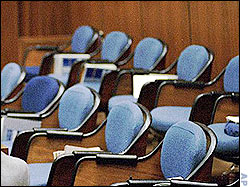
|
|
Court: Verdict stands, even though juror was tanked on vodka
Oct. 1, 2004

|
|
NEW YORK — New Yorkers can not only booze up before serving jury duty, but can also snooze through trial proceedings, according to a ruling handed down by the state's Supreme Court.
After firefighter Samuel Brandon, 60, was found guilty in March of stealing
9/11 souvenirs from the
A visibly drunk John Anastas, 57, approached the defendant and offered to
grab a beer with him, according to
"We were out on the street and I could just smell the alcohol on him," Kliegerman said. "He was so inebriated."
When the defense team learned that Anastas had pounded vodka and water from a Poland Spring bottle during jury deliberations, lawyers immediately filed an appeal on the grounds of juror misconduct.
The plastered panelist, however, actually had the law on his side.
New York Supreme Court Justice Ellen Coin refused to overturn the firefighter's conviction on Sept. 15, 2004, by ruling that Anastas's behavior was just shy of legal misconduct.
Drinking precedent
As outlandish as it sounds, Coin's decision was based on a rarely cited 1987 U.S. Supreme Court ruling.
In that case, several jurors allegedly consumed alcohol during the trial's lunch breaks, used cocaine and marijuana, and even slept through hearings.
The defendants — a Floridian power plant procurement manager and an outside contractor who were convicted on charges of defraud conspiracy — filed a motion for a new trial after the defense attorney was informed that jurors were often incoherent during the trial.
Jurors testified that some of their fellow panelists were often "in a sort of giggly mood" due to intoxication, and others would sleep through the afternoon trial.
According to the U.S. Supreme Court's Federal Rules of Evidence, juror testimony cannot be used to impeach a verdict, except when certain outside influences are inflicted upon a jury.
The court, however, does not recognize juror intoxication as severe enough "outside influence" or "juror misconduct" to sway a verdict.
"Drugs or alcohol voluntarily ingested by a juror — however severe their effect and improper their use — seem not more an outside influence than a virus, poorly prepared food, or lack of sleep," the 11th circuit of the United States Court of Appeals ruled before the case was sent to the U.S. Supreme Court.
The 17-year-old ruling offers little legal recourse for firefighter
"We are still very upset," Kliegerman said. "We were entitled to a jury of six people, but only five of them were awake and focused. I don't see how this is fair."
Though other jurors knew Anastas was intoxicated often during the trial, Kliegerman said they chose not to come forward with the information.
"It's a natural tendency for jury members to not want to get involved and become a witness for the next three years in a new case," he said.
All five jurors ultimately testified against Anastas, claiming he was "annoying" during the trial and extremely "unfocused."
Bombed jurors abroad
Though drunk jurors in the
During the 1998 trial of a accused rapist in
Likewise, during the trial of an accused kidnapper in Plymouth Crown,
By contrast, the
"Sometimes you won't know right away if a juror is drunk or
impaired," said Richard Willstatter, a defense lawyer in
Although Anastas made a clean getaway, the ruling has renewed the controversy surrounding drunk jurors and alerted lawyers on both sides of trials to closely watch the jury box.
"If something happens in a jury room and you see a juror drunk, you would want to boot his ass off the jury as fast as you can," Willstatter said.